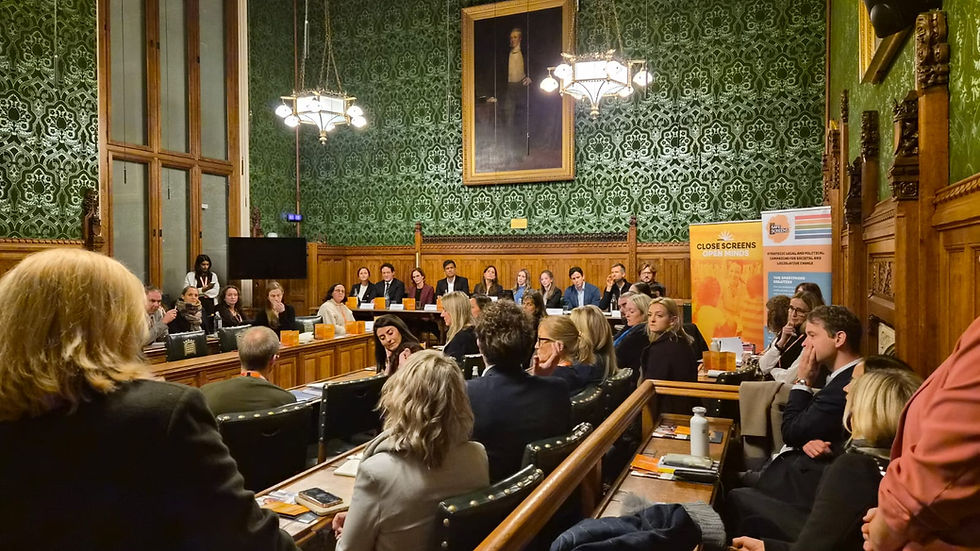Exploring the Health & Well-being Impacts of EdTech & AI on Children – A Cross-European Consultation
- Editorial
- Nov 7, 2025
- 3 min read
At a time when digital technologies, artificial intelligence (AI) and educational technologies (EdTech) are permeating young lives at an unprecedented pace, a new cross-European consultation event is taking place that demands our full attention.

This November, 20, 2025, from 14:00-15:30 GMT, stakeholders across Europe are gathering for the event “Health implications of EdTech + AI on children: a cross-European consultation” organised by EDDS Institute in collaboration with Policy Connect. More on speakers, registration, and objectives, here. This is a unique opportunity for educators, health professionals, policy-makers, technologists, civil society, youth, and researchers to come together and examine not only the promise of EdTech/AI, but the full spectrum of risk and impact — especially on children’s health and well-being.
Why this matters
Children today are growing up in an environment where learning platforms, intelligent tutoring systems, AI-driven games, and monitoring apps are becoming the norm. While much of the discourse has focused on educational benefits and the potential to personalise learning — the health and well-being implications often receive far less attention. Yet evidence is mounting that digital design, algorithmic bias, data collection practices, user engagement patterns and platform behaviours all intersect with health outcomes for children — from mental health to developmental and cognitive trajectories.
Moreover, European-level policy is beginning to recognise this: the DTH‑Lab (Digital Transformations for Health) has pointed out that it is not technology per se that is the issue — but the “digital determinants” of health: design, content, environment and usage. dthlab.org.
What the consultation will do
This consultation event invites cross-European dialogue on topics such as:
How EdTech and AI systems affect children’s physical health, mental health, attention, screen habits and social-emotional development.
The implications of data collection, algorithmic tracking and behavioural profiling in educational/gamified contexts for children’s privacy, autonomy and long-term health.
Risks and opportunities presented by AI-enabled adaptive learning systems: are they supporting children effectively or introducing new forms of bias, exclusion or unintended harm?
The need for robust governance: data privacy, cybersecurity, algorithmic transparency and ethics must be integral, particularly for technologies used by or targeted at children.
How to assess not only educational outcomes, but holistic well-being outcomes — including physical, emotional, social and cognitive health — when deploying new EdTech/AI.
Developing frameworks and tools for impact assessment that cross disciplines: education, health, technology, policy, child rights.
Platform for stakeholder consultation
Here at the EDDS Institute, we believe that to safe use of AI and EdTech must be understood by mitigating the full spectrum of risks and impacts on children. While our work encompasses assessing data privacy and cybersecurity risks associated with EdTech/AI platforms used in children’s environments, and examining AI risk & ethics — including bias, fairness, transparency and accountability — especially when children’s learning and behavioural data are used, we urgently seek to address that health and well-being impact is treated as a first-class consideration: not just “does it improve test scores?” but “does it support healthy development, promote safe screen-time environments, foster resilience, protect mental health?" In a word, we ask: is this product even desirable?
For that, engaging multi-stakeholder dialogues (policy, tech, education, health, civil society, families) to develop holistic frameworks for EdTech/AI impact assessment, regulation and governance, is fundamental.
We believe this event provides a timely and critical convening point for all of these concerns. By participating, contributing and listening, we can help shape the the quality and future of EdTech/AI in ways that truly serve children’s learning and health — rather than inadvertently undermining them.
Join us
We encourage our community of educators, technologists, policymakers, health professionals and families to register for the consultation, engage with the themes, and bring your voice to the discussion.
If you’re interested in what EDDS Institute is doing or how to collaborate on assessments or frameworks, please reach out to us.
To register for the event, see here.



Comments